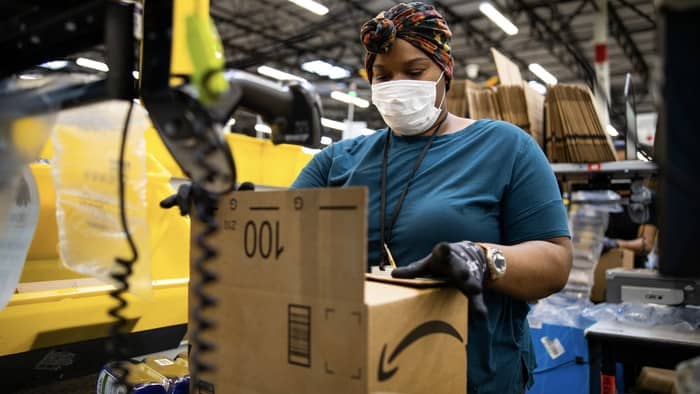This article was originally published on Fool.com. All figures quoted in US dollars unless otherwise stated.
After months of hinting at job cuts, Amazon (NASDAQ: AMZN) just dropped the ax.
The tech giant is planning to lay off roughly 10,000 people in its white-collar workforce, or around 3% of the total, according to The New York Times. The layoffs will target Amazon's devices business, which includes Alexa, as well as retail and human resources. The stock was down modestly on Monday, which was a notable contrast to fellow FAANG stock Meta Platforms, which jumped last week when its layoffs were revealed.
This will be the first round of major job cuts in Amazon's history. They're the upshot of both a slowdown in the broader economy and an overexpansion during the pandemic that led the company to hire and open new warehouses too aggressively. As the pandemic tailwinds have faded, Amazon has been forced to reassess its cost strucuture, especially as it forecast just 2%-8% revenue growth in the holiday quarter and after it lost more than $8 billion in its e-commerce divisions through the first three quarters of this year.
A changing of the guard
The news of the layoffs, which Amazon hasn't officially confirmed, and its guidance calling for its slowest revenue growth in 20 years show the company is entering a new, more mature, stage of life, especially as its revenue is set to top $500 billion this year.
Founder Jeff Bezos, who yielded the top job to CEO Andy Jassy last July, has made "Day One" central to the culture at Amazon. Day One means that employees are to treat the company like a start-up, experimenting, being bold, and, above all, avoiding stasis.
But a 27-year-old company that dominates industries from e-commerce to cloud computing to books isn't a start-up, and it has problems that a start-up doesn't have, like billions of dollars in waste. Not all of Amazon's experiments are going to pay off, and even a company that has famously embraced failure must eventually cut its losses.
Jassy may be quicker to pull the trigger on cost cuts than Bezos was, and it's notable that Alexa is included on the hit list. The voice-activated technology was a pet project of Bezos's, and at one point, he believed that Alexa could become Amazon's "fourth pillar," after its retail marketplace, Prime, and Amazon Web Services. However, it's been eight years since Amazon launched Alexa, and the voice-activated tech has largely been a disappointment. Amazon has struggled to monetize Alexa beyond selling Echo devices at or near cost, and predictions that voice-activated tech would replace conventional internet search or even online shopping have fallen flat. According to The Times, Amazon lost $5 billion on Echo and Alexa in 2018.
What the layoffs mean for Amazon stock
Amazon hasn't made an official announcement on the layoffs so the details aren't yet clear. The move is likely to result in cost savings of at least $1 billion. However, cutting expenses by $1 billion or even $2 billion is unlikely to move the needle for the stock. Investors' lack of reaction to the news shows that Amazon will need to do more to restore profitability and drive a rebound in the stock.
Through the first three quarters of 2021, the company made an $8.1 billion profit in e-commerce. In other words, year-over-year, it lost $16.2 billion in profits in e-commerce, which has crushed its bottom line. That also shows there's significant opportunity for improvement.
That business should eventually recover as macroeconomic headwinds fade and it grows into fixed costs like its warehouses, but it's clear that the company has a lot of fat to trim, and layoffs are just one step in that process. Its international business regularly loses billions of dollars a year, and Amazon may be considering whether to pull out of countries where it isn't profitable and might never be.
Investors can live with slower growth on the top line if it means restoring profitability to 2021 levels, and Amazon should be able to get back there, though it will take at least a few quarters. In the meantime, expect Jassy and the leadership team to fine-tune the business so that it's investing in profitable opportunities rather than burning cash on frivolous experiments.
With the focus on cost-cutting, investors should expect a more profitable Amazon in the future, and that's a good reason to bet on a rebound in the stock.
This article was originally published on Fool.com. All figures quoted in US dollars unless otherwise stated.









